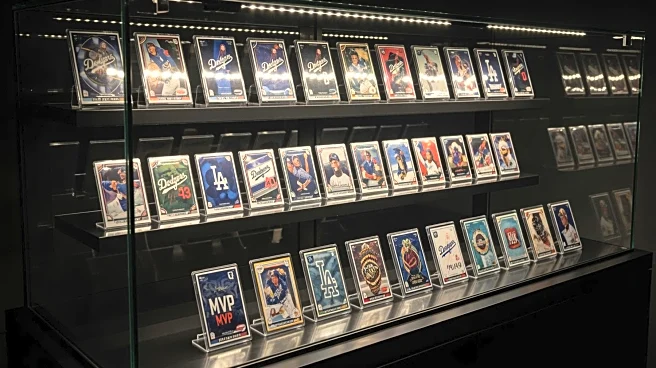What's Happening?
Yoshinobu Yamamoto played a pivotal role in the Los Angeles Dodgers' victory in the 2025 World Series, particularly noted for his exceptional performance in Game 7. His efforts throughout the postseason
earned him the World Series MVP title. This achievement has sparked interest in his 2025 Topps card, which is part of a broader collection of Dodgers World Series MVP cards. Despite his outstanding postseason, Yamamoto's card remains affordable, reflecting a trend where historically significant baseball cards can be collected without significant financial investment. The collection spans several decades, featuring other notable Dodgers players who have been recognized as World Series MVPs.
Why It's Important?
The affordability of Yoshinobu Yamamoto's card, despite his significant contribution to the Dodgers' World Series win, highlights a unique aspect of sports memorabilia collecting. It underscores the accessibility of collecting historically significant sports cards, allowing fans and collectors to own a piece of baseball history without substantial financial outlay. This trend can enhance fan engagement and preserve the legacy of players and teams. For the Dodgers, this collection not only celebrates their achievements but also strengthens their brand and historical narrative within Major League Baseball.
What's Next?
As interest in the Dodgers' World Series MVP cards grows, it is likely that collectors and fans will continue to seek out these items, potentially driving up their value over time. The Dodgers' continued success on the field could further enhance the desirability of these cards. Additionally, the team's performance in future seasons may introduce new players to this collection, expanding its historical and financial significance. Collectors may also look for opportunities to acquire cards from other teams and players, broadening the scope of their collections.
Beyond the Headlines
The trend of affordable sports memorabilia raises questions about the valuation of sports history and its accessibility to the general public. It challenges the notion that significant sports achievements must be accompanied by high-value collectibles, promoting a more inclusive approach to sports fandom. This could lead to a shift in how sports memorabilia is marketed and perceived, potentially influencing the strategies of sports franchises and memorabilia companies.










